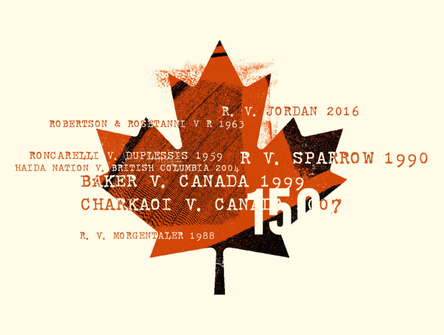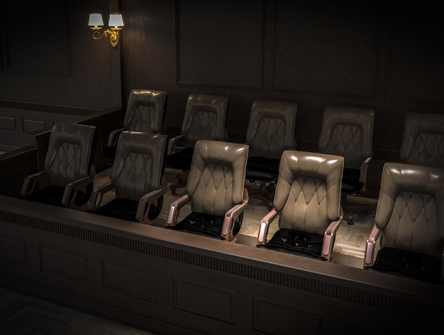No country for libel tourism
Canada isn’t set to become a favourite forum for libel tourists.

Canada isn’t set to become a favourite forum for libel tourists.
The Supreme Court ruled Wednesday that an Ontario court was not, in fact, the best suited to hear a defamation suit filed by a Canadian businessman against an Israeli newspaper. In doing so it allowed a stay on the proceedings.
But the decision split the bench. Justice Suzanne Côté wrote the majority decision, with Justices Russell Brown and Malcolm Rowe concurring. Justices Andromache Karakatsanis, Rosalie Abella and Richard Wagner all filed their own concurring reasons. Justices Michael Moldaver and Clément Gascon, as well as (then) Chief Justice Beverley McLachlin filed joint dissenting reasons.
While the outcome of the case might be relatively clear, the roadmap on dealing with forum selection for online libel cases is less so.
The background
As CBA National reported in 2017, Mitchell Goldhar’s case against Haaretz, a liberal Israeli paper, centered around their coverage of his time running the Maccabi Tel Aviv Football Club, and the alleged dysfunction that plagued it.
Other than the allegation that Goldhar was largely running the team from Canada, the facts of the case involved few connections to Ontario.
Haaretz seized on that and applied for a stay in proceedings. Both the lower and appeal courts denied that motion. They found that there was a real and substantial connection to Canada — given Goldhar’s business dealings in Canada, and the fact that Haaretz published the story online, giving any Canadian full access (though few had read the story.)
What the Supreme Court decided
Justice Côté wrote that “Canada is never singled out as the forum where reputational harm has been suffered for the purposes of this action,” and therefore the purpose of this claim was never limited to Ontario to begin with. And to that end, she concludes, “A robust and careful forum non conveniens analysis indicates that Haaretz would face substantial unfairness and inefficiency if a trial were held in Ontario. Goldhar’s interest in vindicating his reputation in Ontario fails to outweigh these concerns.”
In her concurring reasons, Justice Karakatsanis took a somewhat different view: “Goldhar establishes that Ontario is where he enjoys and wishes to vindicate his reputation,” she wrote. “Thus, I cannot agree that he would suffer no unfairness if he were forced to bring his claim in Israel.” In other words, litigants should have some flexibility in choosing the jurisdiction where their reputation could be most at risk, or where he would most like it preserved.
She allowed the appeal on the grounds that compelling Haaretz to defend itself in Ontario courts would simply be unreasonable. “Any unfairness to Goldhar is outweighed by fairness concerns over Haaretz’s ability to compel its witnesses’ testimony if the claim proceeds in Ontario,” she writes.
Abella, for her part, called for a more stringent test on the new problem of online defamation.
“While material posted on the Internet may harm an individual’s reputation in many places, there will only be one place where that harm hurts the most,” she wrote in her reasons.
“Since the ‘essence’ of the harm in defamation is damage to reputation, this leads me to conclude that the framework for determining jurisdiction should focus on where the plaintiff suffered the most substantial harm to his or her reputation,” she continues, concluding that the forum is evidently Israel.
Wagner, in turn, largely agreed with that new test, although he differed with Abella on how broad the test should be. While the most substantial harm test should determine forum, it should not dictate jurisdiction. “I cannot agree with an approach whereby a Canadian court would conclude that it does not have jurisdiction over a dispute with significant connections to Canada, including potentially significant reputational harm suffered in Canada, simply because greater reputational harm occurred elsewhere,” he wrote.
The minority altogether rejected the place of most substantial harm rule, giving four reasons: “it does not point predictably to one jurisdiction, it would lead to complex preliminary motions, it received only limited support in the Canadian academic literature and jurisprudence, and its adoption in Australia is an insufficient basis for overhauling our own law in this area.”
In the end, the minority court came to a straightforward conclusion: “It would not be unreasonable to hold a trial to settle this dispute in Israel,” they wrote. “But that is not the point. Ontario courts have jurisdiction.”
What does it all mean?
Hilary Young, associate professor of law at the University of New Brunswick, was taken aback by the ruling. “I was surprised that they granted the appeal. I was surprised to see five sets of reasons,” she says. “I thought it was a step in the right direction, albeit a small one.”
Young says the majority court did offer some clarity. For one, the ruling effectively shuts the door on libel tourism — if Goldhar, who did have a firm connection to Canada, couldn’t succeed in bringing his case forward, an opportunistic litigant from another jurisdiction certainly couldn’t.
And though the “basic framework” is clearer for how to deal with libel cases with real connections to Canada, it didn’t go too far beyond that. “What is clear is that the choice of law rule is the same for libel as anything else,” says Young. That means future litigation on libel cases where there could be multiple appropriate forums are going to be “very fact specific.”
“You’re going to have to look at what defences are going to be pleaded, what kind of witnesses are you going to need for that, what languages do they speak,” she says. And that’s what the court did here, hence the majority court (and Karakatsanis) concluded it would be simply unfair to force Haaretz to litigate the case in Ontario.
Abella and Wagner’s attempt to fashion a new test was ambitious, but obviously doomed. According to Young, “these cases don’t come along very often and you should take the opportunity to deal with common law issues when you can.”
Ultimately, the minority court’s conclusion that Ontario courts are both the correct jurisdiction and as appropriate as any court to hear the claim is actually the simplest of the lot, although — as Young, and the majority of the court point out — can lead to jurisdictional confusion.
The real takeaway from the case, Young says, is that libel tourism isn’t going to fly in Canada, and there will remain a pretty specific case-by-case test for online, international libel cases in this country. At least now there is a set of instructions to follow. “Beyond that, there’s still a ton of uncertainty,” she says. “Which, I suppose, is good for lawyers and bad for clients.”


